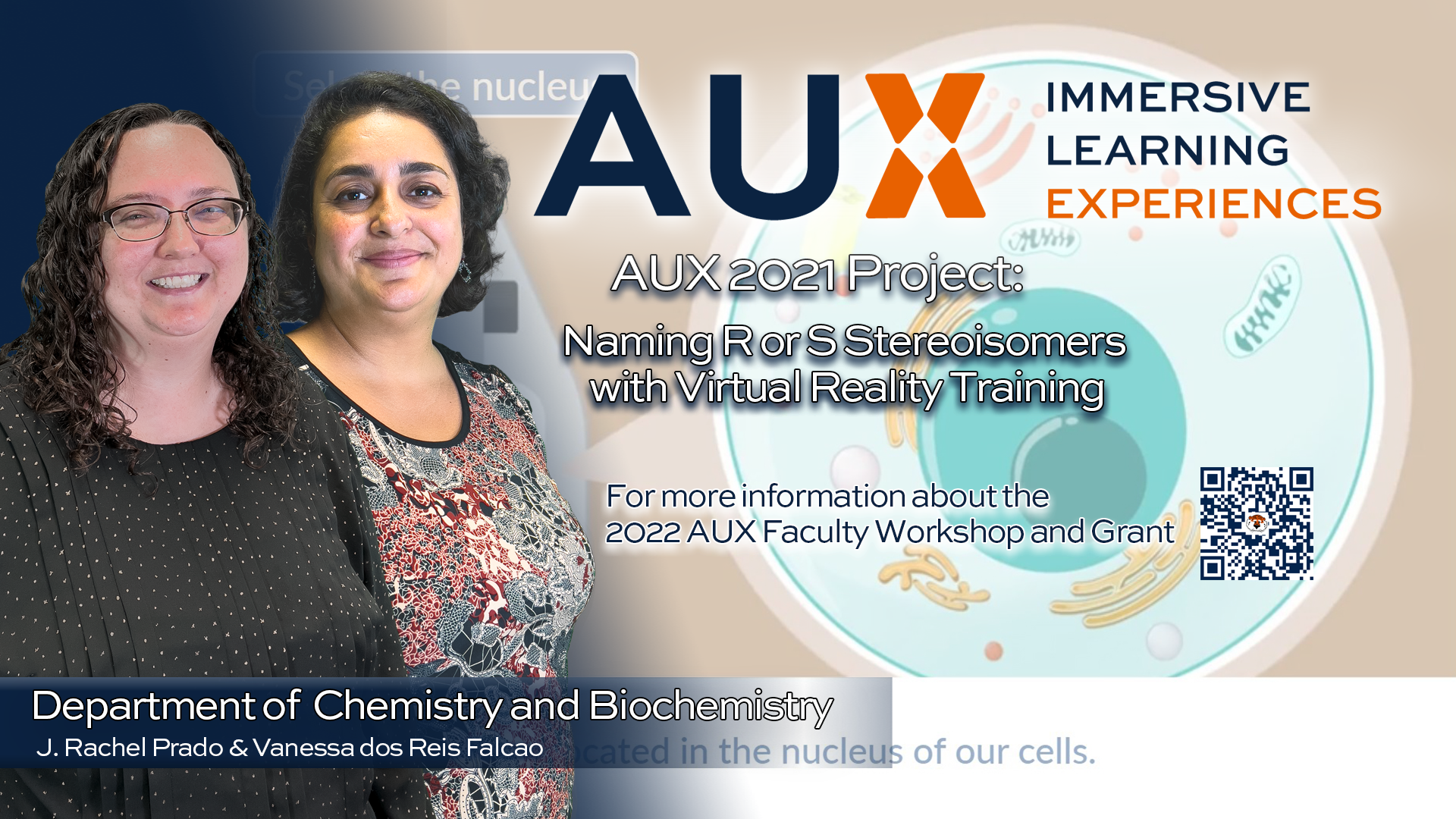COSAM News Articles 2022 October COSAM’s Prado and Falcao to present at 2022 AUX: Immersive Learning Experiences Workshop
COSAM’s Prado and Falcao to present at 2022 AUX: Immersive Learning Experiences Workshop
Rachel Prado and Vanessa dos Reis Falcao, lecturers in the Department of Chemistry and Biochemistry in the College of Sciences and Mathematics, or COSAM, will present at this fall’s AUX: Immersive Learning Experiences Workshop offered by the Office of Information Technology, or OIT, and the Biggio Center. The event will be held Thursday, October 6 from 8:30 a.m. – 4 p.m. in the Mell Classroom Building at Ralph Brown Draughon Library.In 2021, OIT and the Biggio Center created a new funding opportunity titled “Student Learning Through Immersive Virtual Experiences”, which resulted in six faculty projects that received full funding. Prado and Falcao were among the faculty named as 2021 grant recipients and are slated to present at the workshop, alongside other recipients, about their AUX 2021 project from 10 a.m. – 11:30 a.m.
In their AUX 2021 project, titled “Naming R or S Stereoisomers with Virtual Reality Training”, Prado and Falcao noted that chemistry can be illustrated using three representational domains: macroscopic, symbolic and particulate. While expert chemists can transition fluently between each domain, students find this difficult. To thoroughly understand particulate-level concepts, students need to visualize and manipulate particulate models in their minds, which is particularly true in organic chemistry where students learn the topic of stereochemistry.
In their project, Prado and Falcao included a guided walkthrough of the important steps in labeling R or S stereocenters, including (1) identifying the chiral center, (2) assigning priority groups, and (3) rotating the molecule to label R or S. This activity was contextualized using biological molecules to engage students in a relevant real-world scenario. Students were engaged in an active learning experience using several interactive elements including sliders, practice questions, animations and WebVR. These elements provided an immersive experience to help gain the spatial reasoning necessary to rotate molecules in their minds and translate traditional 2-dimensional chemical representations into 3D.
“Teaching organic chemistry is incredibly difficult because a student must be able to rotate molecules with their mind's eye,” said Prado. “Linking how a two-dimensional static bond line structure would rotate in three dimensions is tricky. I've always thought about creating a program that would show both the bond line structure and three-dimensional model rotating at the same time, but I'm a chemist without a background in coding.”
With the announcement of the VR grant, Prado knew this was an excellent opportunity to build a program to help students visualize molecules.
“Vanessa and I worked closely with Auburn Online to not only make a program that shows the bond line and three-dimensional model rotating together, but they also helped us create a tutorial that walks students through the process and highlights the biological relevance of stereochemistry in the body,” Prado said. “My students are very excited to be the first to work through the tutorial, and I know I will use it for many years to come.”
“Working with Auburn Online has been an incredible experience,” said Falcao. “There is so much work that goes behind the scenes we had no idea. Our project will reach a vast number of students and from the pilot going on so far, the preliminary data is showing that 94% of students strongly agree and agree that they have a better visualization of 3D molecules, 87% of students reported a better understanding of stereochemistry and 77% said they are more confident about labeling stereocenters.”
A complete agenda and registration link for the October 6 workshop can be found here. Faculty are encouraged to attend the workshop to explore the potential uses of VR/AR/XR technologies in teaching and learning. Additional goals of the workshop are to promote faculty-led generation of ideas on how these technologies can be utilized in their existing courses for more immersive learning experiences and to encourage interested faculty members to apply for the AUX: Immersive Learning Experiences grant.
Latest Headlines
-
04/12/2024
-
04/02/2024
-
04/02/2024
-
04/02/2024
-
03/27/2024

